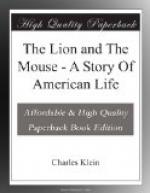And what, asks the foreigner, has the American hustler accomplished that his slower-going Continental brother has not done as well? Are finer cities to be found in America than in Europe, do Americans paint more beautiful pictures, or write more learned or more entertaining books, has America made greater progress in science? Is it not a fact that the greatest inventors and scientists of our time—Marconi, who gave to the world wireless telegraphy, Professor Curie, who discovered radium, Pasteur, who found a cure for rabies, Santos-Dumont, who has almost succeeded in navigating the air, Professor Rontgen who discovered the X-ray—are not all these immortals Europeans? And those two greatest mechanical inventions of our day, the automobile and the submarine boat, were they not first introduced and perfected in France before we in America woke up to appreciate their use? Is it, therefore, not possible to take life easily and still achieve?
The logic of these arguments, set forth in Le Soir in an article on the New World, appealed strongly to Jefferson Ryder as he sat in front of the Cafe de la Paix, sipping a sugared Vermouth. It was five o’clock, the magic hour of the aperitif, when the glutton taxes his wits to deceive his stomach and work up an appetite for renewed gorging. The little tables were all occupied with the usual before-dinner crowd. There were a good many foreigners, mostly English and Americans and a few Frenchmen, obviously from the provinces, with only a sprinkling of real Parisians.
Jefferson’s acquaintance with the French language was none too profound, and he had to guess at half the words in the article, but he understood enough to follow the writer’s arguments. Yes, it was quite true, he thought, the American idea of life was all wrong. What was the sense of slaving all one’s life, piling up a mass of money one cannot possibly spend, when there is only one life to live? How much saner the man who is content with enough and enjoys life while he is able to. These Frenchmen, and indeed all the Continental nations, had solved the problem. The gaiety of their cities, and this exuberant joy of life they communicated to all about them, were sufficient proofs of it.
Fascinated by the gay scene around him Jefferson laid the newspaper aside. To the young American, fresh from prosaic money-mad New York, the City of Pleasure presented indeed a novel and beautiful spectacle. How different, he mused, from his own city with its one fashionable thoroughfare—Fifth Avenue—monotonously lined for miles with hideous brownstone residences, and showing little real animation except during the Saturday afternoon parade when the activities of the smart set, male and female, centred chiefly in such exciting diversions as going to Huyler’s for soda, taking tea at the Waldorf, and trying to outdo each other in dress and show. New York certainly was a dull place with all its boasted cosmopolitanism.




